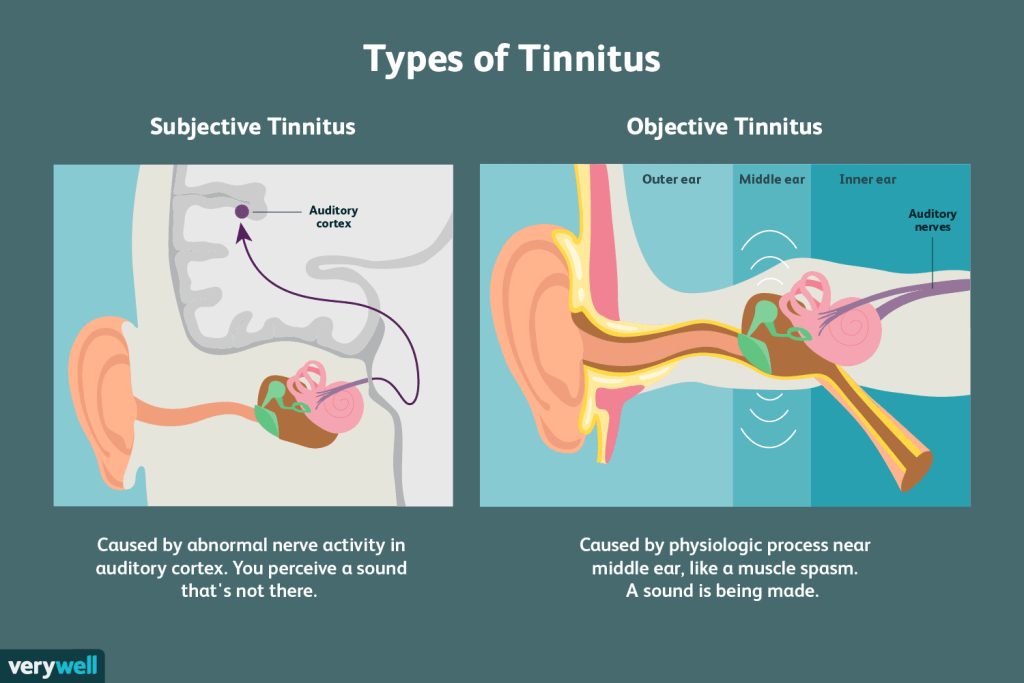 What is tinnitus?
What is tinnitus?Tinnitus UK (formerly British Tinnitus Association) describes tinnitus as “the sensation of hearing a sound when there is no external source for that sound”. The symptoms may be felt as ringing, buzzing, hissing, clicking, whistling, whooshing sounds, etc and may be constant or intermittent, varying in volume from person to person. Tinnitus is thought to affect around 13% of adults in the UK.
According to Tinnitus UK, the noise may be in one or both ears, or it may feel like it is in the head. It may be low, medium or high pitched and can be heard as a single noise or as multiple components.
Occasionally people have tinnitus that can seem like a familiar tune or song, known as musical tinnitus or musical hallucination. Others have tinnitus which has a beat in time with their heartbeat — known as pulsatile tinnitus.
The symptoms are usually caused by an underlying condition with strong links to hearing loss in general.
The Tinnitus Awareness Week is an annual campaign dedicated to raising awareness and educating people about the causes, impact and management of tinnitus. This year’s event will be held from Monday 5 to Sunday 11 February.
Research conducted by the Health and Safety Executive (HSE) has indicated that the prevalence of tinnitus in workers exposed to noise at work is significantly greater than in workers not exposed to noise.
Therefore, jobs at particular risk of tinnitus are those characterised by loud or prolonged noise. For example, carpenters, construction and manufacturing workers, airport staff, musicians, call centre personnel and street workers could be among those at risk, as are people who work with chain saws, guns or other loud equipment as well as those who are exposed to loud music at work.
However, causes can also be completely unrelated to noise at work and linked to non-work-related hearing loss as well as ear infections or various illnesses such as diabetes, thyroid disorders, multiple sclerosis, anxiety, depression and Ménière’s disease.
According to the NHS, tinnitus can also be caused as a side effect of some chemotherapy medicines, antibiotics, non-steroidal anti-inflammatory drugs (NSAIDs) and aspirin.
In the context of tinnitus, if noise in the workplace regularly reaches 80 to 85 decibels, to protect their staff, the employers could take steps such as:
The Control of Noise at Work Regulations 2005 apply to all industry sectors in Britain and aim to ensure that workers’ hearing is protected from excessive noise, which could cause them to lose their hearing and/or to suffer from tinnitus. See the Noise topic for information and guidance.
The HSE warns that many thousands of people are exposed to loud noise at work that may be a risk to their hearing.
In addition, ototoxic chemicals — substances which can harm hearing, even in the absence of noise levels — also carry risks which can be under-acknowledged, but are associated with often life-changing effects related to hearing loss. See our feature The life-changing risks of ototoxic chemicals.
In a survey, 42% of tinnitus sufferers believed that their condition had an adverse effect on their work, and loss of concentration, lack of sleep and anxiety associated with the condition can all make working more difficult. However, tinnitus can also impact on working in other ways including, for example, difficulties:
Employers also need to understand their responsibilities to staff with tinnitus or hearing loss under the Equality Act 2010 and will need to be prepared to make reasonable adjustments to support staff with hearing difficulties.
It is recommended by Fit for Work advisors that people who have hearing loss or tinnitus inform their managers of their condition and discuss changes that could help, such as moving to a different workstation, changing meeting venues or reducing stress.
Also helpful is an online resource called Take on Tinnitus. It has been designed primarily for people who have just begun to experience tinnitus. However, it is also a valuable resource for those who have experienced the condition longer term.
Some cases of tinnitus, such as those caused by the build-up of ear wax or because of an ear infection, can be treated by a doctor. In other cases, there is no cure, and treatment is focused on developing coping mechanisms in order to live with the condition. Various therapies may be helpful including the following.
A wide range of treatments and a number of specific medications, including antidepressants, amitriptyline and melatonin for example, have been reviewed by Tinnitus UK and evaluated using an extremely helpful traffic light system, based on their safety and efficacy.
Tinnitus UK runs a chat service via its website.
In addition, there is a network of tinnitus support groups around the country, listed via Tinnitus UK’s website, where people can develop and learn about new coping skills and gain inspiration and encouragement from others.
Tinnitus UK runs a large research grants programme to support tinnitus research. It recently partnered with scientists and academics from the Nottingham Biomedical Research Centre and the Universities of Nottingham and Newcastle to conduct innovative research, using imaging data from thousands of brain scans held in the UK Biobank, a major national and global health resource. It is thought that chronic tinnitus may be associated with changes in the structure of the brain, and that reversing these changes might prove effective in the treatment of the condition.
It is estimated that tinnitus affects over seven million people in the UK at present, and many people elsewhere around the world, potentially causing stress, sleep difficulty, anxiety and compromising hearing.
As research efforts continue, it is hoped that soon a cure for this enigmatic and distressing medical problem will be found.
If you have any queries, please contact us.